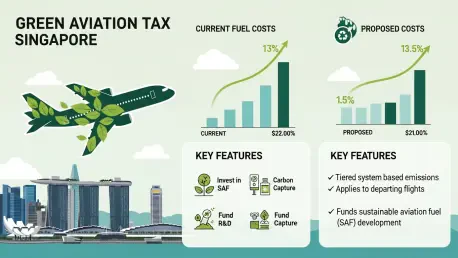In a world increasingly focused on combating climate change, the aviation industry faces mounting pressure to reduce its carbon footprint, and Singapore has emerged as a trailblazer with a groundbreaking initiative that could set new standards for sustainability. This small but influential nation is poised to become the first country globally to introduce a green fuel tax on air passengers, a move that could redefine sustainability standards in air travel. Set to take effect from October 1, 2026, with ticket sales impacted as early as April 1 of the same year, this policy by the Civil Aviation Authority of Singapore (CAAS) aims to promote the use of Sustainable Aviation Fuel (SAF). By imposing a levy on departing travelers, the initiative seeks to fund cleaner fuel alternatives and contribute significantly to global decarbonization efforts. This bold step not only highlights Singapore’s commitment to environmental responsibility but also raises questions about how such policies might reshape the aviation landscape worldwide, balancing ecological goals with economic realities.
Pioneering a Sustainable Aviation Model
Singapore’s introduction of the SAF levy marks a pioneering effort to integrate environmental accountability into the cost of air travel, with a carefully structured fee system based on distance and class of travel. The levy is divided into four geographical bands, ensuring that the financial impact reflects the carbon footprint of each journey. For shorter flights within Southeast Asia, economy passengers will pay a modest S$1.00, while premium cabin travelers will contribute S$4.00. In contrast, long-haul flights to the Americas will incur higher fees of S$10.40 for economy and S$41.60 for premium seats. Notably, transit passengers are exempt from this tax, a decision that focuses the burden on those initiating their journeys from Singapore. This nuanced approach, as articulated by CAAS Director-General Han Kok Juan, strives to engage all aviation users in sustainability efforts without placing undue strain on the industry or travelers. It reflects a pragmatic balance, aiming to drive change while preserving Singapore’s status as a competitive global air hub.
Setting a Global Precedent for Green Policies
Looking back, Singapore’s implementation of the SAF levy stood as a landmark moment in the journey toward net-zero carbon emissions in international aviation, aligning with the International Civil Aviation Organization’s ambitious target for 2050. This initiative not only showcased a forward-thinking approach but also served as a potential blueprint for other nations grappling with the environmental challenges of air travel. As the policy unfolded, it became evident that such financial mechanisms could fund critical advancements in sustainable fuel technology. Moving forward, the global aviation community might consider adopting similar levies, inspired by this model, to accelerate the shift to greener practices. Governments and industry leaders should explore collaborative frameworks to standardize such taxes, ensuring fairness and efficacy across borders. Ultimately, the success of this approach hinged on continuous evaluation and adaptation, offering a foundation for future innovations in reducing aviation’s environmental impact.









